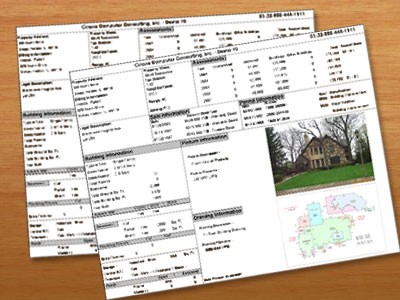How to Appeal Your PropertyTax BillKiplinger
Post on: 17 Июль, 2016 No Comment

A well-researched appeal can slash your property tax bill.
Chances are pretty good that you’re paying more in property taxes than you should be. According to the National Taxpayers Union, as many as 60% of properties in the U.S. are assessed at a higher amount than their current value.
Slide Show: 7 Steps to Lower Your Property Taxes
That may surprise you, since median home prices nationwide are down to levels last seen in 2003. But assessments don’t necessarily move in lock step with market values. For one thing, properties are typically assessed only once every two to three years, according to an NTU survey of assessors, and sometimes the cycle is longer. So while home values drift down, assessments stay put.
And property taxes are likely to head up. Severe budget shortfalls at the local level — to the tune of $94 billion in this fiscal year — mean municipalities are spreading the pain among taxpayers. In the most recent election cycle, voters concerned about budget shortfalls approved increases in property tax rates — especially in California, Michigan and Ohio — says Pete Sepp, a spokesman for the NTU. In a recent poll of Kiplinger’s readers, 52% said their property taxes had gone up in the past year (but only 16% planned to appeal them).
In many areas, the combination of over-assessed properties and higher taxes has homeowners fighting back. Not every appeal is successful (Sepp estimates that just 20% to 40% of properties of all types are granted some reduction in value), but a well-researched case will boost the odds of success.
Advertisement
Greg Cudahy of Milton, Ga. bought a home in August 2009. The following year, his property tax assessment showed a valuation that was 44% higher than the price he had paid. He filed an appeal, but his county’s counteroffer was still 24% higher than the sale price. He decided to take the appeal to the next stage, and the Fulton County Taxpayers Foundation, a nonprofit advocacy group that assists local property owners in appealing their assessments, took his case to the local appeals board. Cudahy’s assessment was reduced to equal his home’s sale price. He says that when he gets his next tax bill, he expects to see savings of at least $4,000.
Assess your assessment. Before you start the appeal process, research how your local government assesses property. Look at the length of time between assessments as well as how the market value of a home is determined. An appraiser might compare your property with similar, recently sold properties to determine its market value, then multiply that by a set fraction, known as the assessment ratio. So if a property’s market value is determined to be $100,000 and the assessment ratio is 80%, the assessed value for property tax purposes should be $80,000. Another method sometimes used in rural areas or wealthy neighborhoods where homes have unique features is to estimate the cost of replacing a house, adjusting for factors such as the land value.
The next step is to check for errors in your assessment. Your local assessor’s office can provide your property’s record card (it may be referred to as the working papers or a worksheet), which has information used to assess your property, such as dimensions and number of rooms. Check that the square footage listed is correct for both the house and the land. If you find an outright error — for example, the card says your home has three bathrooms but it has only two — you may be able to show the assessor your blueprints to get a reduction and skip the formal appeal.
Investigate the assessed value of similar properties in your area to see how yours compares. Look at property cards for homes of similar age and square footage with the same number of bedrooms and bathrooms. If you find that your assessed value is considerably higher than that of at least five homes (the more you can document, the better), you may have a solid case for appeal. Try to find comparable properties that are as close as possible to your own — nearly the same square footage, in the same neighborhood, and with similar grades of construction materials. You may be able to find the records on your assessor’s Web site.
Even if you find, say, three properties assessed at a higher value and three lower, don’t throw in the towel right away. You may be able to argue for a reduction based on certain differences between your home and comparable ones. Maybe your house is the only one with a less-than-desirable view of the city water tower, Sepp says, or you might have lousy grading that doesn’t allow you to have a garden.
Get all the breaks you deserve. You may be eligible to shield a portion of your property’s value from the tax man. In some places, such as Florida and Washington, D.C. anyone who owns a home and lives in it can file for a homestead exemption or credit, which excludes some of the home’s value, regardless of income or the property’s value. Seniors, veterans, the disabled and other groups may be able to get an additional tax exemption or to get one in states that don’t offer a break to all homeowners. In Ohio, for example, people 65 and older or those permanently and totally disabled are eligible for an exemption of up to $25,000 of a home’s market value.
Tax exemptions may be subject to income limits or linked to taxes that benefit school districts. In New York, homeowners with incomes below $500,000 can exempt the first $30,000 of a home’s full value from school property taxes — even if they have kids in the public-school system — and seniors with incomes of less than $79,050 can exempt the first $60,100 of a home’s value from school taxes.

Circuit breaker credits set a limit on how much property tax households must pay in relation to income. For example, senior citizens in Massachusetts who have incomes below specified thresholds and who meet other requirements can claim a credit if they paid more than 10% of their income in property taxes. Contact your state’s department of taxation or visit its Web site to see what breaks are available to you.
Fight back. Rules vary by locality, but your assessment letter should explain how an appeal works. Most likely, you’ll send your evidence, such as listings of comparable properties, blueprints, repair estimates and photographs, to the assessor for review. You may be able to negotiate a settlement informally before the assessor completes the rolls and get a reduction right away. If you can’t come to a settlement, be sure to pay your tax bill to avoid penalties or a lien on your home. You’ll get a refund in some form if the county eventually approves your appeal — possibly a check or reduction in your bill in future years.
Read all the fine print on your appeal form to make sure you’re complying with the requirements, and keep copies of documents and other information you present. You should receive a response within a couple of months. If you don’t get a reduction in your assessment — or, as in Cudahy’s case, you think the reduction isn’t large enough — the next step is to bring the case before an independent local appeals board. Here you’ll have the advantage of making your case in person. You can use any visual aids, such as photographs, that could help you, and you may pass out copies of your important points in writing to each member of the board.
Usually, you can take a case that fails at the local level to a state board, which may function much as the local one does. Or it may handle only narrowly defined cases. Beyond that, you’re looking at a judicial hearing. For a homeowner, court fees and the cost of a lawyer probably outweigh any reduction.
Where to get help
Tracking down expert assistance to save time or reinforce your appeal may be worth the price. One option is to enter your address at ValueAppeal.com. which will pinpoint comparable properties in your area, their sale price and their assessment data. If the site determines that you have a strong case, you can buy a report to send to your appeals board for $99. You’ll get the money back if your appeal is rejected.
Hiring a professional real estate appraiser who will take a thorough look at your property provides the strongest evidence of its worth, but check whether your community allows outside appraisals in an appeal before you get one. If you go this route, find someone with national certification, such as through the Appraisal Institute or the National Association of Independent Fee Appraisers. Several factors contribute to the cost of an appraisal, but expect to pay about $250 to $500. Nanette Albanese, assessor for the village of Scarsdale in Westchester County, N.Y. suggests bolstering your case by hiring someone who has spent years in the community and recognizes differences among neighborhoods. If they’ve made a legitimate claim, we’re happy to rectify the situation, she says.Be wary of solicitations from law firms or other services offering to assist you with an appeal in return for a high percentage of any savings on your bill. Most often, residential homeowners can go through the process on their own. For $9.95, you can buy the National Taxpayers Union’s guide How to Fight Property Taxes.














